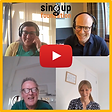top of page
Music Therapy and Music Participation
With Sarah McColl Wiltshire & Vicky Guise

A wonderful opportunity to do a deep dive with two leading music therapists. Sarah and Vicky generously share their knowledge, creating this guide and film which helps us to understand how music therapy fits with music participation in general.
In this section
Share this
About the Authors
Sarah McColl-Wiltshire
Sarah dabbled in a few different instruments throughout primary and early secondary school including violin and flute, but it was not until she was allowed to pick up a second instrument aged 14 that she found her passion in classical guitar. Sarah studied Applied Music at Strathclyde University in Glasgow with a focus on guitar performance. After graduation, Sarah realised that there was something missing for her and, after feeling lost for a while, realised that the missing element was helping others. Sarah worked as a support worker for children and adults with learning disabilities before starting her therapy training. Sarah’s first placement during training was with children in a primary school, and she has since then focussed her work on supporting children experiencing emotional difficulties and their families. Sarah enjoys integrating art and play with music, which is what led her to working with Place2Be.

Vicky Guise
Vicky qualified as a Music Therapist in 2019, having completed her training at the University of South Wales. Initially, Vicky trained as a flute player at the Royal Welsh College of Music and Drama, during which time she auditioned to be part of the Live Music Now scheme. This work involved performing for people that may not be able to access live music through traditional routes in places such as care homes, hospitals and SEN schools. This work in particular led to Vicky exploring further ways she could use music to connect with others and what led to her training as a music therapist. Since qualifying, Vicky has worked a variety of client groups including older adults, people who have experienced brain injury, stroke survivors as well as children and young people. She now works for the arts organization Chroma, particularly working in school and neuro rehabilitation settings.

You might also be interested in...
News
Podcast
bottom of page
_edited.png)





























